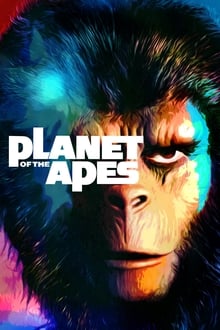
I'm a seeker, too. But my dreams aren't like yours. I can't help thinking that somewhere in the universe there has to be something better than man. Has to be.
Planet of the Apes is directed by Franklin J. Schaffner and adapted to screenplay by Michael Wilson and Rod Serling from the 1963 Pierre Boulle novel La planete des singes. It stars Charlton Heston, Roddy McDowall, Kim Hunter, Maurice Evans, James Whitmore, James Daly and Linda Harrison. Music is scored by Jerry Goldsmith and Leon Shamroy is the cinematographer.
3978 A.D. and a spaceship and its crew crash down on a distant planet. Three astronauts survive the crash, they appear to be on a planet not unlike their own, Earth. But soon they come to learn that this planet is ruled by intelligent apes, the human being is the lesser species, mute and of basic intelligence..
It was a tough sell to studios back in the 1960s, not only was the premise that formed Pierre Boulle's novel a tricky one, but the technical aspects, cost and quality of, also had the men in suits backing away from producer Arthur P. Jacobs and beefcake actor Charlton Heston. Eventually Dick Zanuck over at Fox nervously agreed to make it as long as significant tests ensured that farce would not follow. Stumping up $50,000 for John Chambers to develop the ape make up and masks, and a successful test run acted out by Edward G. Robinson as Dr Zaius opposite Heston, Planet of the Apes was given the green light. The script went through a number of changes as Serling and Wilson tossed around ideas to improve on Boulle's page turner, while Heston himself felt that the novel as written was unfilmable. Elsewhere, when director Schaffner came on board, he himself went for a more primitive ape world as opposed to the one under consideration that featured futuristic high rises and super advanced technology. What came out at the end of it all thankfully is one of the greatest sci-fi movies of all time.
What would follow the success of the film is well known, a number of inferior sequels, a TV series, a remake and even a prequel in 2011. Then of course there was the toys, models, comics, cartoons and T shirts - it at times felt in the 70s that there really was a Planet of the Apes, only this one was driven by commerce. The aftermath of the original film has not done it any favours, the lines have become blurred, with so much muck and tack about, it often gets forgotten just how clinically great Schaffner's movie is. If ever there was a film that deserves to be a standalone, this is the one. Follow Heston's brawny Taylor from the pitiful planting of the stars and stripes at the beginning, to that monumental ending, and then leave it at that, do not pass go, do not venture further into any sort of monkey business. No sequel necessary, for Planet of the Apes to truly hit you with maximum impact, it all needs to end right there on that shoreline. As the great Rod Serling intended in fact.
Thematically the picture is acknowledged as being caustically strong, a sociological allegory, with pinches of racial animus just for flavouring. It might be under the guise of a sci-fi movie, but the makers aren't trying to hide it. Whilst the narrative twitches with comment, whoosh was that an aside to the Scopes trial? Film is also full of visceral thrills, pop-culture references and unnerving (alienation like) photographic beauty. The former comes with the hunt sequence, where we first meet gorilla's on horses, with guns and attitude, the latter with Shamroy's Panavision/De Luxe colour lensing of the California and Arizona locations. All enhanced by Goldsmith's aural pinging percussive led score. And while we continue to remember some of those famous bits of dialogue, we also pick up on each revisit to the film those little slices of humour slotted into the story - human see, human do indeed and the visual cheek of hear no evil, see no evil, speak no evil...
Film of course hinges on Heston's central human performance, of which he delivers athletic guts and subtle nuances in equal measure. Taylor's character arc demands repeat viewings to fully appreciate what Heston brings to the role. Take in the cynical Taylor who wanders through the Forbidden Zone in the first quarter, then marry it up to the Taylor fighting for his life in the middle, and finally to the Taylor at the denouement, it's a three pronged acting turn of some undervalued distinction. Not all muscular "presence" actors are/were able to be credible, Heston was. Around him in the monkey suits are true professionals, Hunter, McDowall, Evans (coming in for Robinson who feared for is health in the suit) and Whitmore, while Harrison in the non speaking human role of Nova does her job of looking gorgeous! All that's left to say is that Schaffner, who would win the Academy Award for Best Director two years later for Patton, pulls it all together neatly. 10/10